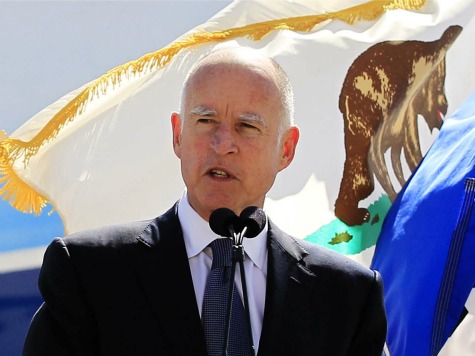California Gov. Jerry Brown used yesterday’s “State of the State” address to congratulate himself on his state’s recovery: “A million new jobs since 2010, a budgetary surplus in the billions and a minimum wage rising to $10 an hour!” Yet he ignored the state’s obvious, lingering problems: high unemployment, a massive debt driven by pension obligations, and problems plaguing his pet project, the state’s hyper-expensive high-speed rail line.
Brown, like Wisconsin Gov. Scott Walker, is celebrating a significant surplus ($3.3 billion to Wisconsin’s $900 million). Like his Republican counterpart, Brown is saving some of that surplus “for the lean years which are sure to follow.” Yet unlike Walker, who began his state’s recovery by cutting taxes to attract investment, Brown is not giving anything back to taxpayers. Instead, he is using much of it to restore government spending.
In contrast to what California’s Democrats want him to do, Brown’s approach is an example of fiscal responsibility–one celebrated as such by the mainstream media. At his speech Wednesday, Brown used a prop: playing cards featuring his dog on one side and a graph of California deficits on the other, showing that the state had usually followed years of balanced budgets with years of massive, unsustainable deficit spending.
Yet in comparison to what is actually needed to grow the state’s economy, and to solve its long-term fiscal problems, Brown’s approach is failing. California’s unemployment rate remains among the nation’s highest, at 8.5%, and it is suffering massive out-migration to other states–not of the wealthy, who can afford to pay Brown’s higher taxes, but of the middle class, who cannot tolerate the cost of living and stagnant job market.
Brown also refuses to face up to the root cause of California’s hundreds of billions of dollars in debt and unfunded liabilities, which is the might of the public sector unions–something for which he bears great personal responsibility, having granted those unions collective bargaining powers during his first term as governor, in 1976. Walker famously confronted such unions, and his state is much the better for it.
The one problem on which Brown dwelled was the state’s crushing drought, which he blamed on global climate change. His proposed solution is to reduce the state’s consumption of fossil fuels, which he hopes will somehow affect global weather patterns. In fact, if California increased fossil fuel exploration and development, onshore and offshore, it would wipe out unemployment and even its staggering debt. Yet Brown will never consider that.
Though he denies wanting to run for the presidency in 2016, Brown surely has a fourth run in mind. He knows that Democrats enjoy a degree of grade inflation in the mainstream media when it comes to fiscal responsibility. The media have ignored Walker’s stunning success in Wisconsin, for example, but are already praising Brown for engineering a California “miracle” and allowing him to posture as a rare Democratic fiscal conservative.
Brown may emerge as one of the few Democrat leaders with a record of modest success. He is fast becoming a symbol of blue-state governance for a media eager to focus on the good intentions that supposedly drive such policies, rather than their grim results. Even the issue of inequality, which Democrats profess to care about, is flaring up as a result of liberal governance. Despite the true state of the state, Brown remains unscathed.

COMMENTS
Please let us know if you're having issues with commenting.